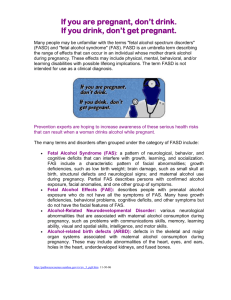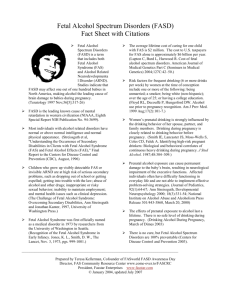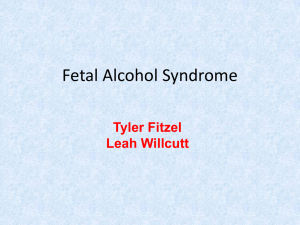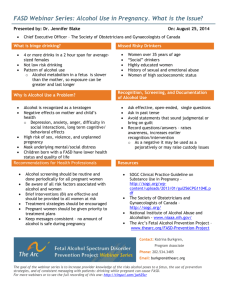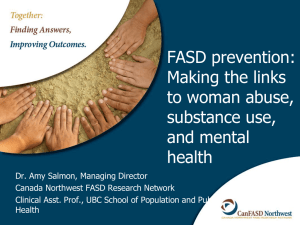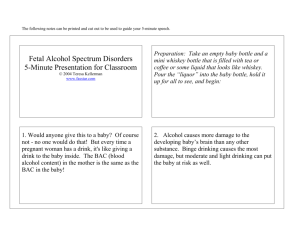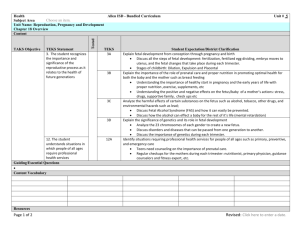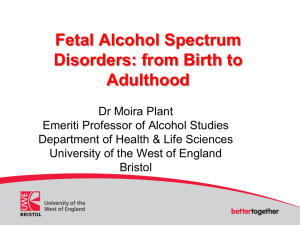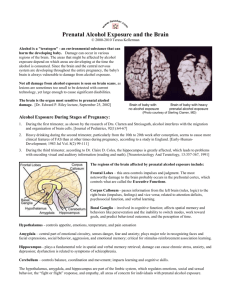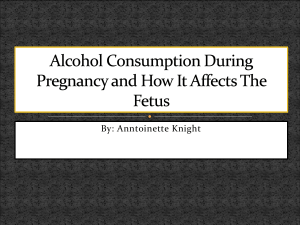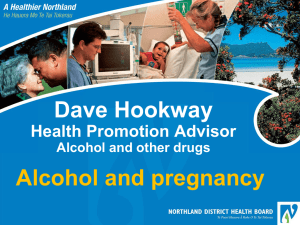File - Stacy Everett`s EPortfolio
advertisement
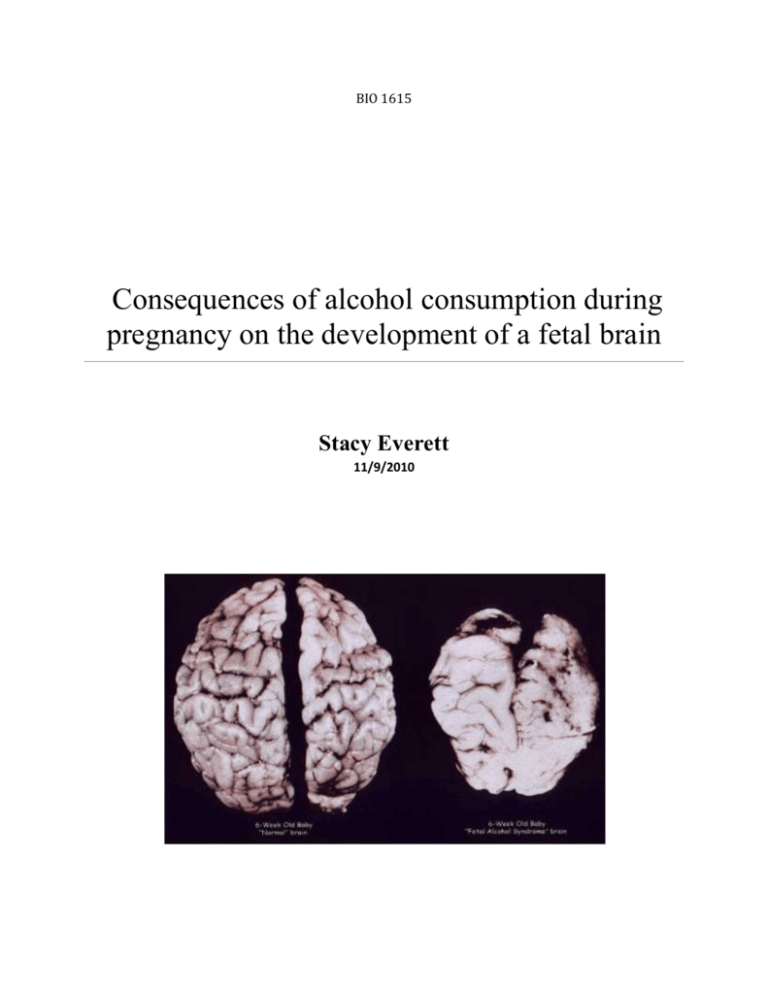
BIO 1615 Consequences of alcohol consumption during pregnancy on the development of a fetal brain Stacy Everett 11/9/2010 Consequences of alcohol consumption during pregnancy on the development of a fetal brain Alcohol consumption during pregnancy is an ongoing and devastating problem, Fetal Alcohol Syndrome (FAS)or Fetal Alcohol Spectrum Disorder(FASD) is one of the leading know preventable cause of mental retardation.( 1 National Institute on Alcohol Abuse and Alcoholism No. 50 December 2000,Fetal Alcohol Exposure and the Brain) In addition to the classic dysmorphic facial features growth abnormalities,80% of children with FAS have behavioral problems and as much as 50% of affected children also have poor coordination and attention deficit hyperactivity disorder.(2 American Academy of Pediatrics Volume 106 No.2 2000 Fetal Alcohol Syndrome and Alcohol Related Neurodevelopment Disorders)Many children and adults with FAS have a variety of language and memory problems and many have slow reaction time.(1)Many people with FASD have poor impulse control and self-monitoring and might engage in risky of illegal activity to fit in with peers.(7) FAS is truly devastating to all those it affects and those who come in contact with it, and it can be prevented. There is no known “safe” dose of alcohol that can be consumed by pregnant women without risking damage to their unborn child. (1) Throughout this paper I will discuss some of the demographics for a mother that is at risk of having a child with FAS and the affects of alcohol on brain development of fetus and some disorders that result from alcohol consumption during pregnancy. I will also discuss ways to help decrease and intervene in the consumption of alcohol during childbearing years. There have been some studies done on the demographics of woman who may be at risk of giving birth to a child with FAS or FASD related problems. In one study done, around 1400 woman who gave live births were surveyed, from around 48 states in the United States, the woman were asked several questions regarding the amount they drank 3 months prior to being pregnant which includes a critical portion of the first trimester. 51% of these woman reported consuming alcohol in the months prior, 11% reported moderate drinking and 1 % reported heavy drinking. Given that almost half of all pregnancies in the U.S are unplanned, these reports suggest that a number of woman in childbearing age 18- 44 could be drinking moderate to heavy levels while in the early stages of unrecognized pregnancy.( 3 American Journal of Preventative medicine Volume 17 Issue 2 1999 Alcohol use prior to pregnancy recognition) The study found that the woman with the highest prevalence rates of frequent preconceptional drinking had 4 strong risk factors they were identified in this study a : smoker, white non-Hispanic, younger than 25 and were not married. Approximately 60% of the woman who said they were frequent drinkers did not know they were pregnant until after the fourth week of gestation, and 30% of those woman didn’t know they were pregnant until they were 6 weeks along. Once pregnancy recognition occurred a significant number of women stopped drinking, and among those who drank in larger amounts significant reductions in the amounts they consumed were recorded. (3) In another study was done that suggest that some woman might have a genetic predisposition to infliction of more severe damage by gestational alcohol consumption. The absence of a certain allele that has been proposed to play a possible protective roll for fetal outcome, studies are still being done to determine if you can be predisposed to having a child with more severe FAS. (4 BMC Genomics 2007 Computational selection and prioritization of candidate genes for Fetal Alcohol Syndrome) Since most of the woman may not even know that they are pregnant until they are about 3 weeks along or further which is an important part of brain development for the fetus they don’t know about the damage that could have already occurred in their unborn baby. There are several biological and environmental factors that are known to influence the effects of alcohol on the developing brain, including dose of alcohol, developmental timing of exposure. (5 Oxford Journals 2009 Fetal Alcohol Spectrum Disorders and Alterations in Brain and Behavior) Here are some of the damages that can already be done to the growing fetus in the first trimester. Ethanol is a 2-carbon alcohol, responsible for the behavior-altering effects of alcoholic beverages. (6 Alpha online Ethanol, Chemistry of Alcohol) Ethanol also has an effect on the fetus’s brain development .Embryonic cells designed to become brain neurons grow in number, and moved to their ultimate location and mature into a wide variety of functionally distinct neuronal cell types. Alcohol metabolism also creates free radicals and is associated with increased to cell damage and causes damage to those neurons. Free radicals damage and kill sensitive populations of brain cells at this critical time in development. (1) Alcohol also has a negative effect on brain development by, reducing neural progenitor’s pool and causing long term effects on the forebrain as well as on a mature brainstem and nuclei structures. Studies demonstrate that chronic alcohol abuse during this early fragile stage in the fetus is associated with a greater incidence of facial defects and mental disabilities. (5) It also effects early brain development in the Cerebral Cortex in the brain during the second trimester of pregnancy, at this stage most of the areas of the central nervous system begin to differentiate. (5) Studies of prenatal alcohol exposure have consistently found impaired motor control. Motor control is a complex function influenced by the central nervous system. It also involves the peripheral nervous system, which provides sensory feedback to the central nervous system. Neurotransmitters are chemical messengers that allow communication to occur among nerve cells in the brain. This occurs thousands of times a day and is responsible for brain function. Prenatal exposure to alcohol significantly disrupts many neurotransmitter systems. (7 Substance Abuse and Mental Health and Human Services FASD the course Module 2)It also affects the hippocampus that is involved in memory. Alcohol can change the fibers and cause cell reduction. Some people with FAS have deficits in spatial memory and other memory functions associated with the hippocampus, it also acts as a mood control center. Damage to the hippocampus can affect the ability to respond appropriately to emotions, such as anger. (7)A study done on rats showed that there was a reduction in the thickness of the cerebral cortex and in brain size which likely contribute to the cognitive defects observed in adults with FASD.(5) The corpus callosum connects the two hemispheres of the brain. Prenatal alcohol exposure can cause abnormalities such as thinning or complete absence of the corpus callosum. These abnormalities have been linked to deficits in attention, intellectual function, reading, learning, verbal memory, and psychosocial functioning. (7) In the third trimester, a period characterized by glial development, glial cells are present throughout the central nervous system and play critical roles in developmental events. During embryogenesis radial glia provide physical and chemical guidance for the migration of young neurons and play a key role in synaptic function. Synaptogenesis and development of the cerebellum are also being developed at this stage in pregnancy. (5) T he cerebellum is involved in both motor and cognitive skills. The cerebellum tends to be smaller in people with an FASD. Damage to the cerebellum can cause learning deficits and problems with motor skills, such as balance and coordination. (7) The frontal lobes are also formed at this stage in pregnancy and are also effect by the consumption of alcohol. The frontal lobes control executive functions, such as planning and problem solving. They also control impulses and judgment. (7)Portions of the frontal lobe appear to be especially sensitive to alcohol consumption. It can also lead to abnormal cists or cavities in the brain. There also can be significant losses and abnormalities of gray and white matter in the brain of someone with FAS. (5) Despite all the knowledge of the affects of alcohol on an unborn child there is still a growing number of FAS and FASD related births. There needs to be more proactive measures taken so that this problem can be reduced. Major efforts should be made at all levels of society to develop educational programs about the consequences of alcohol of an unborn child, and should be presented in junior high and high school students and in collages. (2) Especially to encourage women of childbearing age who are drinking to use effective methods of contraception to help avoid an unintended pre natal alcohol exposure. (3) Primary health care providers and woman clinics and facilities serving families with young children such as Women Infant and Children’s clinics should give advice and education regarding alcohol use and the adverse affects on pregnancy. (3)Health care providers in the areas with higher alcohol consumptions should also consider using specific screening instruments such as the AUDIT and the TWEAK, the woman who screen positive for an alcohol problem and then be provided with interventions. Studies found that brief advice and counseling by primary care physicians to be very effective in reducing problem drinking, particularly among females. (3) Parents of children diagnosed with FAS or FASD should receive appropriate support services for them and their child including guidance directed toward preventing similar problems in the future.(2) Many women do not even know that they are pregnant and a significant amount of damage can be done to the unborn child. There is no known “safe” dose of alcohol that can be consumed by pregnant women without risking damage to their unborn child. (1) Hopefully by increasing awareness and doing these preventive actions we can reduce the number of children affected by prenatal alcohol consumption and the devastating effects it can have on the rest of their lives. Our future unborn children have no choice in the matter so let’s make the best choices we can for them. References 1. National Institute on Alcohol Abuse and Alcoholism No. 50 December 2000 Fetal Alcohol Exposure and the Brain http://pubs.niaaa.nih.gov/publications/aa50.htm 2. American Academy of Pediatrics Volume 106 No.2 2000 Fetal Alcohol Syndrome and Alcohol-Related Neurodevelopment Disorders http://aappolicy.aappublications.org/cgi/reprint/pediatrics;106/2/358.pdf 3. American Journal of Preventative medicine Volume 17 Issue 2 1999 Alcohol use prior to pregnancy recognition 1 http://www.sciencedirect.com/science?_ob=ArticleURL&_udi=B6VHT-3X3K7RF1&_user=464852&_coverDate=08%2F31%2F1999&_rdoc=1&_fmt=high&_orig=search&_origin=sea rch&_sort=d&_docanchor=&view=c&_acct=C000022310&_version=1&_urlVersion=0&_userid=464 852&md5=1d974c22a36d2d6e31833acd2a2ce4e1&searchtype=a 4. BMC Genomics 2007 Computational selection and prioritization of candidate genes for Fetal Alcohol Syndrome http://www.ncbi.nlm.nih.gov/pmc/articles/PMC2194724/pdf/1471-2164-8-389.pdf 5. Oxford Journals 2009 Fetal Alcohol Spectrum Disorder and Altercations in Brain Behavior http://alcalc.oxfordjournals.org/content/early/2009/01/15/alcalc.agn105.full.pdf+html 6. Alpha online 2010 Ethanol, Chemistry of Alcohol http://www.nutramed.com/alcohol/ethanol.htm 7. Substance Abuse and Mental Health Services Administration FASD the course module 2 http://www.fasdcenter.samhsa.gov/educationTraining/courses/FASDTheCourse/module2/index.cfm Picture http://www.hopebythesea.com/blog/uploaded_images/fas-brain-790496.jpg
